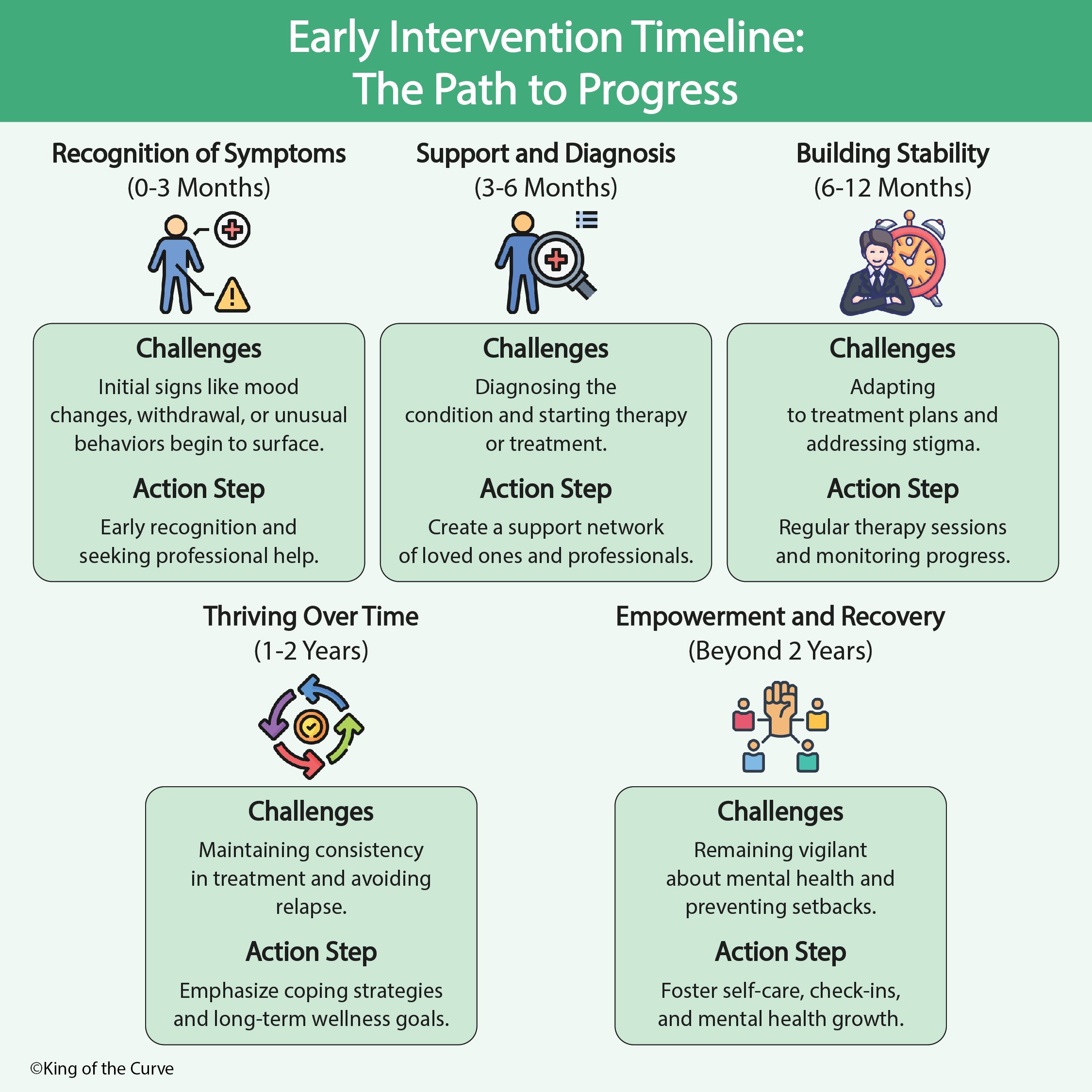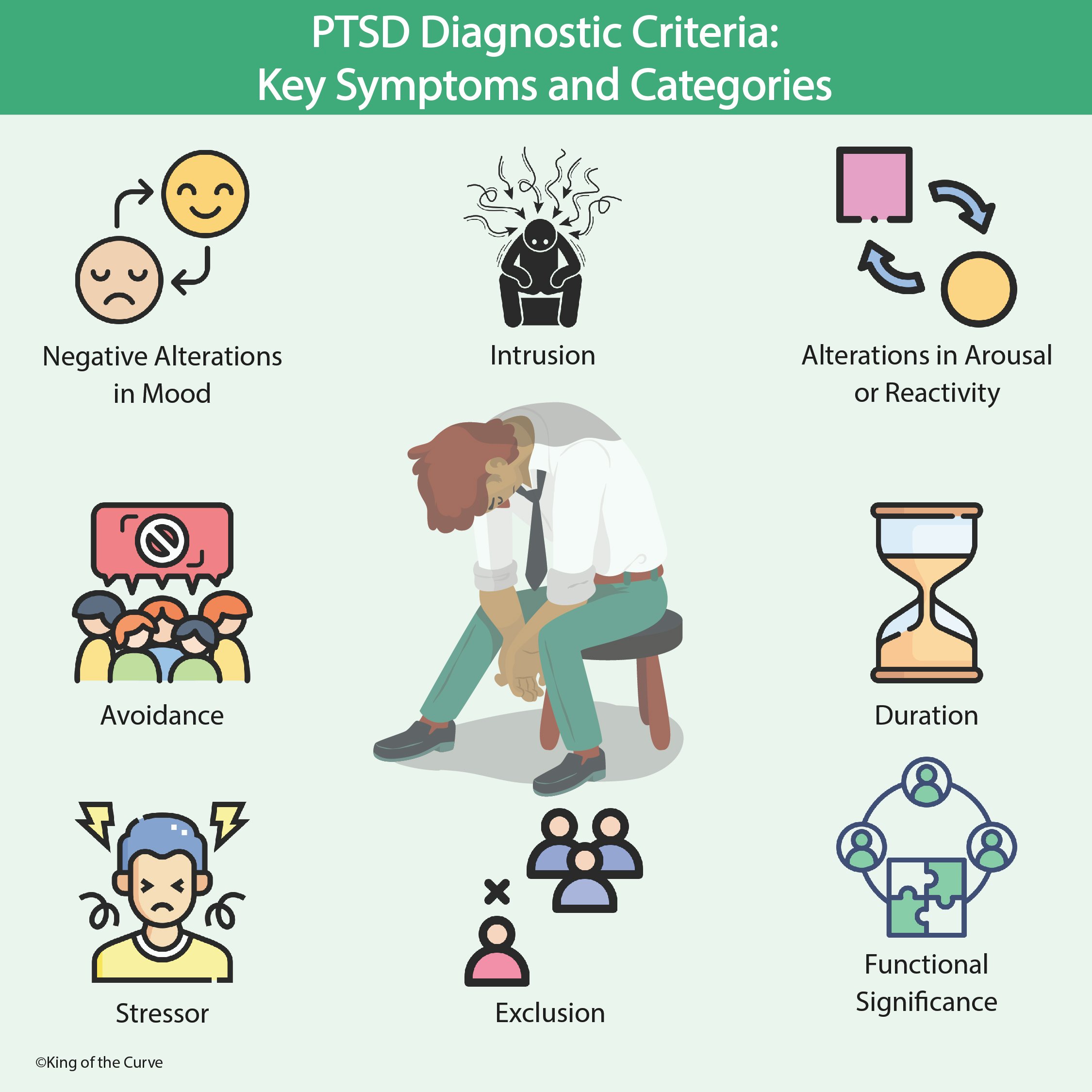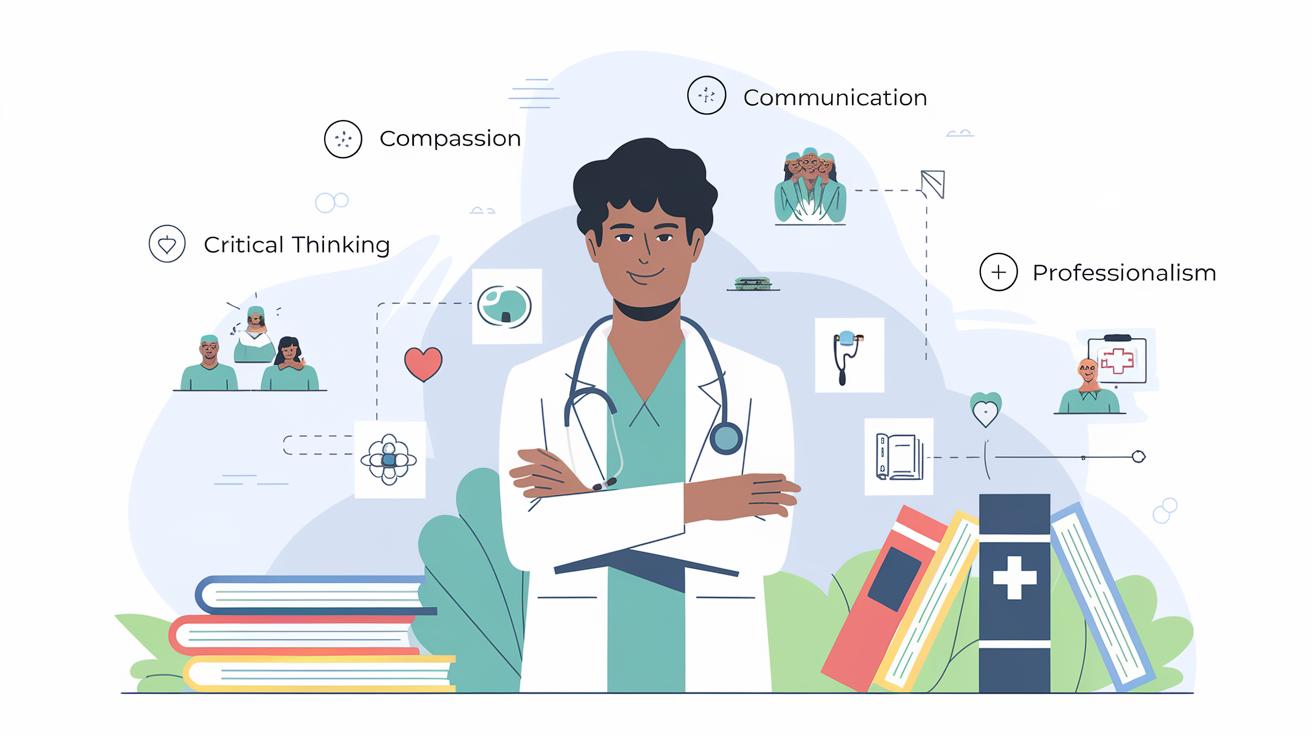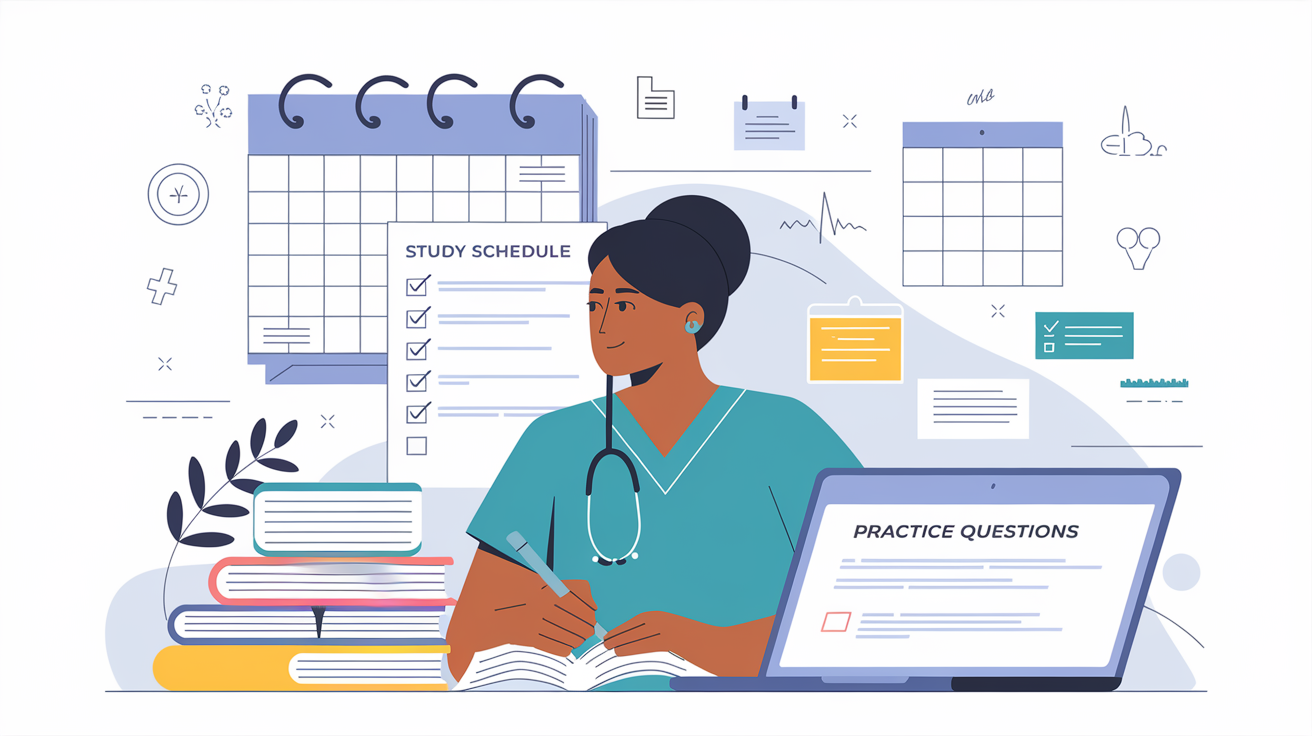
Recognizing Panic Attack Symptoms: A Must-Know for MCAT and Pre-Med Students
Learn how to recognize panic attack symptoms and their relevance to the MCAT. Understand stress responses, neurotransmitters, and real-world applications in medicine. Read more on King of the Curve!

Early Intervention in Mental Health: A Timeline for Better Outcomes | KOTC MCAT
Learn about the early intervention timeline in mental health, from recognizing initial symptoms to advanced treatment. Discover how timely action improves outcomes, reduces severity, and aligns with key MCAT psychology topics. Read more on KOTC MCAT!

Act Early, Thrive Later: The Benefits of Early Diagnosis and Treatment
Recognizing the early signs of mental health conditions and seeking treatment can significantly improve patient outcomes. As future medical professionals, MCAT students must understand the importance of early diagnosis, intervention, and long-term management of psychiatric conditions. The MCAT covers these principles in the Psychological, Social, and Biological Foundations of Behavior section, making them essential knowledge for test day and beyond.

Understanding the Differences Between Delusions and Hallucinations
Mental health conditions can present with a variety of symptoms, but two of the most misunderstood are delusions and hallucinations. While they may seem similar, they are distinct experiences that affect individuals in different ways. Understanding their differences is crucial for medical professionals, caregivers, and students preparing for exams like the MCAT.

What Are Sensory Hallucinations?
Misconceptions about mental health conditions, particularly delusions and hallucinations, can lead to stigma, fear, and inadequate support for those affected. By fostering understanding and empathy, we can break down barriers and improve patient outcomes.

Empathy Over Stigma – Understanding Delusions and Hallucinations for Pre-Med Students
Misconceptions about mental health conditions, particularly delusions and hallucinations, can lead to stigma, fear, and inadequate support for those affected. By fostering understanding and empathy, we can break down barriers and improve patient outcomes.

The Power of Empathy in Mental Health
Mental health awareness isn’t just a buzzword—it’s a cornerstone of modern medicine. As you prepare for the MCAT, you’ll encounter questions about psychological disorders, including symptoms like delusions and hallucinations, which are often tied to conditions like schizophrenia or bipolar disorder. But beyond the exam, understanding stigma, empathy, and mental health symptoms prepares you to connect with patients in real-world clinical settings.

Understanding the Importance of Early Mental Health Intervention
Mental health plays a crucial role in our overall well-being, yet early intervention is often overlooked. The journey to recovery is a process, and taking the right steps at the right time can make all the difference. In this blog, we’ll explore the early intervention timeline and how recognizing symptoms, seeking support, and maintaining stability can lead to long-term mental wellness.

Understanding PTSD: Key Symptoms and Diagnostic Criteria
Learn about PTSD symptoms, diagnosis, and treatment options. Understand key signs like intrusion, avoidance, and mood changes. Find help for PTSD recovery today!

Gradual Physical Changes and Social Engagement Across Adulthood
Discover how physical changes occur in adulthood and the importance of social engagement for healthy aging. Learn prevention tips for aging gracefully!

Erikson’s Stages of Psychosocial Development: Conflict and Growth Across the Lifespan
Explore Erikson’s 8 Stages of Psychosocial Development, from infancy to later life. Learn about key conflicts, positive outcomes, and how each stage shapes personality and well-being.

Erikson’s Stages of Psychosocial Development: A Comprehensive Guide
Human development is a complex journey shaped by experiences, relationships, and challenges. One of the most influential theories explaining this process is Erik Erikson’s Psychosocial Development Theory. It outlines eight key stages spanning from infancy to later life, each defined by a psychosocial conflict that must be resolved to achieve healthy psychological growth.

Seasonal Affective Disorder (SAD): Understanding the Emotional Impact of Changing Seasons
Seasonal Affective Disorder is a real and impactful condition, but by recognizing its signs and symptoms, individuals can take proactive steps to manage it effectively. Whether it’s light therapy, staying socially active, or improving diet and sleep, small lifestyle changes can make a big difference in combating the winter blues.

Abdominal Aorta: Key Anatomy and Clinical Relevance for the MCAT
The abdominal aorta is a major artery that supplies oxygenated blood to the abdominal organs and lower extremities. Understanding its branches, anatomical positioning, and clinical significance is crucial for medical students and MCAT aspirants.

Mechanism of Action of Selective Serotonin Reuptake Inhibitors (SSRIs) – MCAT Behavioral Science Insight
Selective serotonin reuptake inhibitors (SSRIs) are a widely prescribed class of antidepressants that play a key role in treating mood disorders. Understanding their mechanism of action is essential for MCAT success, particularly in the Psychological, Social, and Biological Foundations of Behavior section.

How Cultural and Social Contexts Shape Behavior: A Deep Dive for MCAT Success
Understanding cultural and social contexts is crucial for the MCAT, as it enhances your grasp of human behavior, a core component of the Psychological, Social, and Biological Foundations of Behavior section. This topic isn't just about memorizing definitions—it's about analyzing how norms, values, peer influence, and cultural dynamics influence behavior.

What Makes a Great Doctor? Reflecting on the Core Traits Med Schools Look For
Becoming a great doctor goes beyond academic excellence—medical schools seek candidates who demonstrate compassion, critical thinking, adaptability, and a passion for lifelong learning. These core traits help doctors build trust with patients, navigate complex medical situations, and continuously evolve in their practice. Aspiring medical students can develop these qualities through clinical experiences, volunteer work, and utilizing tools like King of the Curve to enhance problem-solving and communication skills.

The Ultimate Pre-Med Planner: Key Deadlines and Milestones for 2025
Planning for medical school requires careful organization and strategic goal-setting. From MCAT prep to application submissions, staying on track with deadlines is crucial for success. This pre-med planner outlines key milestones—finalizing study plans, securing recommendations, and preparing for interviews—while leveraging tools like King of the Curve to optimize your preparation. Stay focused and proactive to ensure a smooth journey toward medical school in 2025.

Top Health Concerns in 2025: Why Premeds Should Be Aware of Public Health Trends
As future healthcare professionals, premed students must stay informed about the evolving landscape of public health. In 2025, critical issues such as the mental health crisis, chronic disease management, and health disparities continue to shape healthcare delivery. Understanding these trends allows aspiring doctors to provide better patient care, advocate for preventive measures, and address social determinants of health. Platforms like King of the Curve help students stay ahead by offering personalized study tools and insights into key healthcare challenges.

New Year, New You: Setting Realistic Goals for NCLEX Prep and Beyond
The new year is the perfect opportunity for nursing students to set achievable goals for NCLEX preparation and their future careers. By assessing progress, setting SMART goals, and developing a structured study plan, you can stay on track and maximize your success. Incorporating tools like King of the Curve’s Adaptive Q-Bank, practicing self-care, and celebrating milestones along the way will help you stay motivated and focused. With a balanced approach, you can confidently work towards becoming a licensed nurse in 2025.
